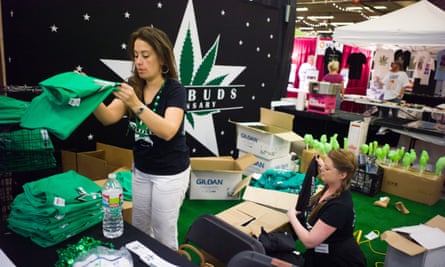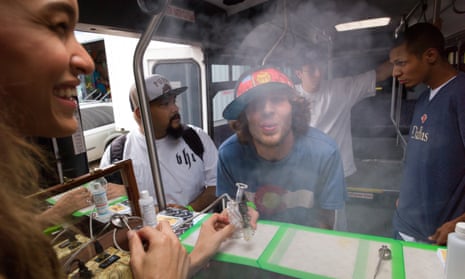It’s not unusual for 24-year-old Maggie Copeland to have a conversation with her coworkers about pot.
“It’s quite professional,” she said of her nonprofit office in Denver, Colorado. “Weed comes up a lot.
“After a tough day, it’s not uncommon that people at work will say ‘I’m gonna go smoke a bowl’ instead of ‘I’m gonna have a glass of wine’.”
If demand is any indication, in the 18 months since recreational marijuana sales became legal, pot has been a booming success. There are now four dispensaries in the Denver area for every Starbucks in the city. And that ratio is growing rapidly.
Though Colorado and Washington both became the first US states to legalize marijuana in November 2012, Colorado has earned far more publicity because its retail sales began six months earlier, giving new meaning to the state’s “Rocky Mountain High” theme song. (In addition to the John Denver song, that slogan is now the name of a dispensary chain with seven locations across the state.)
Officials have tried to fight back against this reputation. Earlier this year, officials at the Denver international airport extended a ban on the sale of any marijuana-related souvenirs. After all, airport spokesman Heath Montgomery argued: “We don’t want marijuana to be the first thing our visitors experience when they arrive.”
But it’s hard to go very far in Denver without getting a whiff of what marijuana has done to and for the city.
Denver is one of the fastest-growing cities in one of the fastest-growing states. Residents attribute some of that growth to pot. The city saw rent prices increase 9.6% during the first year of legalization, according to ApartmentList.com, more than three times as fast as the national average. Real estate prices jumped 10%, a phenomenon many linked to the pot industry.
“It’s been interesting how much rent has gone up and how expensive it is with this inflow of new people,” said Paige Craig, 22. Craig said despite high rents, legalization has overall been “a pretty big plus”.

“Everyone and their fucking brother is coming here now,” said Travis Barton, a 32-year-old lifelong resident of Denver, referring to both new residents and tourists.
It’s not just the pot-curious who are moving to Denver, but also businessmen who would like some of their money.
This wave of “ganjapreneurs” has turned marijuana into a $700m business in Colorado, and that doesn’t account for the massive eruption of secondary businesses that have developed to supplement dispensaries.
“It’s a gold rush,” Barton noted. “There’s lots of money to be made.”
For every staple of modern society, Colorado also offers a pot-infused sibling. Tourists at the airport can take a Super Shuttle, or they can grab a 420 Airport Pickup shuttle to go directly to a dispensary before heading to their hotels. Want to take a tour of Denver, but one that doesn’t force you choose between seeing the sights and enjoying some green? Book a 420 Tour. Tired of boring old summer camps? Sign up for CannaCamp instead. And while you’re at it, let the squares stay at traditionalbed and breakfasts while you relax at a Bud and Breakfast, sipping a homemade canna-banana smoothie to get your energy up for a High Urban Hike before relaxing for the evening at a members-only pot cafe. Wake up early for a day of classes, from cannabis-friendly yoga to Puff, Pass & Paint to a pot cooking class, followed by a Medicated Massage featuring cannabis-based creams and analgesics.
(Terrible puns are a standard byproduct of the marijuana industry.)
Nearly half of Americans say they have tried pot, and the actual number is likely higher. But in Washington DC, where residents also voted to legalize marijuana possession (though not yet its sale) last year, the culture is markedly different.
Public puffing is not uncommon, and many are even starting to avail themselves of the new law’s provision for growing marijuana at home. But there, frank weed talk between coworkers or strangers remains a faux pas in many circles.
Kat Maramba, a communications strategist in Washington, pinpointed a typical concern of her friends who did smoke: “Openly discussing pot would hurt their career.”

Another Washingtonian who chose to remain anonymous said young professionals who have federal jobs with security clearances that require clean drug tests aren’t likely to risk their career to light up. Though he hasn’t personally smoked in years, he argued that this is a simple matter of inertia.
“I don’t know any drug dealers anymore,” he said. “I would definitely smoke on the regular if I could buy it in a store.”
Not only can you do so in Colorado now, but it can be a refined, professionalized experience. Walking into a dispensary is not unlike walking into a fine wine shop, where knowledgeable attendants walk you through the subtleties of dozens of options: “This Fruity Pebbles strain has a berry undertone with tropical floral overtones.” It’s more like shopping at Whole Foods than having an exchange with a drug dealer.
This professionalization has cut into the profits of some of the dealers Craig knew. “Even though it’s more expensive to go to the dispensary, the workers there know way more about bud,” she explained. “They explain each strain. You get to see them. You trust it more because you know what’s in it and how it’s going to affect you.” Plus, she added, “people are a lot pickier about it now. It’s like gourmet food. You go in and you have 15 different choices with great descriptions.”
This professionalization may be a factor contributing to the increase in marijuana use among adults since it was legalized in Colorado for adults 21 and older. (Contrary to many critics’ predictions, multiple studies have found that teen marijuana use is flat or dropping following legalization in Colorado.) Though criminalizing marijuana is an ineffective deterrent for many, there are plenty of folks who would use pot if there weren’t the hassle of drug dealers and sneaking around to avoid the law.
“I have lots of coworkers who I can’t imagine ever going to a drug dealer,” Copeland said. “But now that they can just walk into a dispensary, they’re far more likely to indulge.”
The one development since legalization that even supporters of the new law consider a downer: newcomers who break pot etiquette. “People give legal pot a bad name because they’re kind of amateur about it,” Barton said, pointing to people who light up in public, a legal no-no. Craig agreed. “It bothers me when people smoke in public. They aren’t educated about the laws and regulations, and those are the kind of people that make me angry.”

Comments (…)
Sign in or create your Guardian account to join the discussion